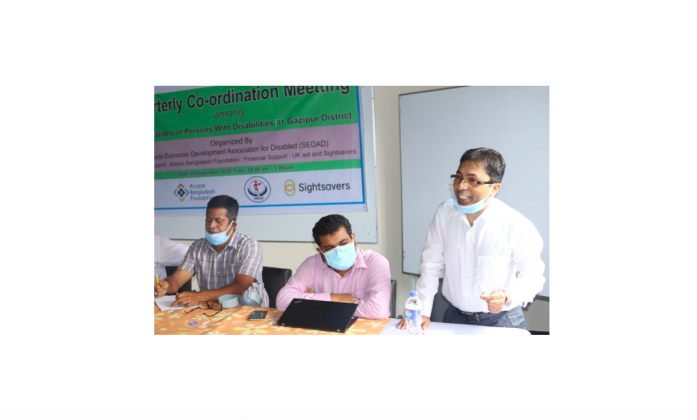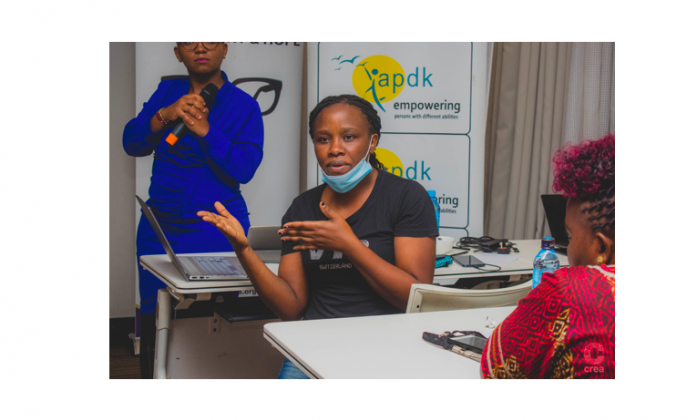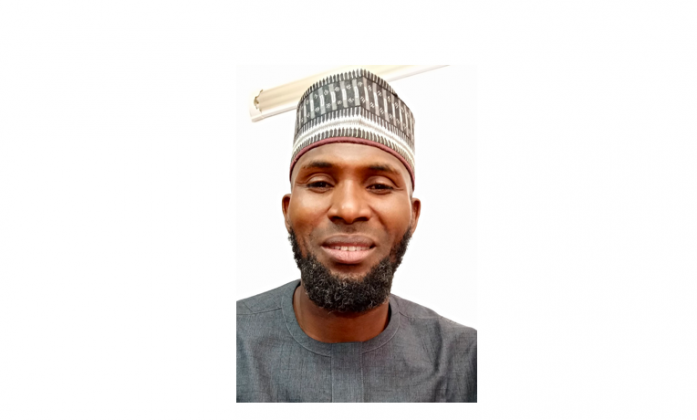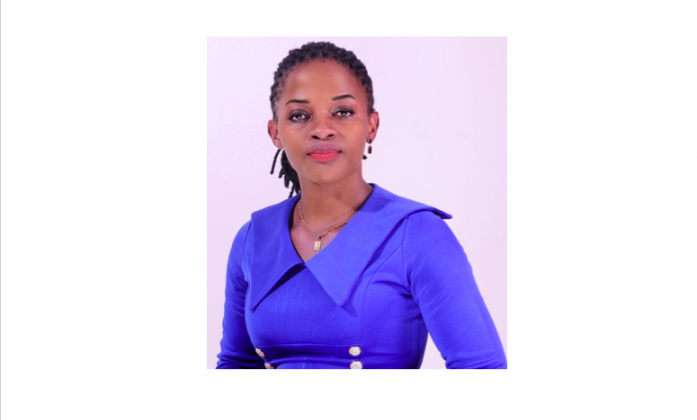The International Disability Alliance (IDA) is one of the 11 partners within the Inclusion Works (IW) program. One of the key roles that IDA plays in this consortium is to support meaningful engagement of persons with disabilities and their representative organisations (OPDs), particularly through the work of the OPD Engagement Officers (OPD EOs) at the national level. In Kenya, Nigeria and Uganda the OPD EOs are part of the African Disability Forum (ADF). In this article, the OPD EOs recount their experiences over the past year.
OPD Engagement Officers’ achievements

Rejaul: One of my priorities has been to support the IW program on the inclusion of underrepresented and excluded disability groups. It is heartening to note that the representation rate is gradually rising. We now have more partners tracking diversity within our target groups. Also, the age limits and educational criteria for capacity building opportunities of jobseekers has been made flexible for deaf candidates, persons who are deafblind, and persons with intellectual disabilities.

Elizabeth: Over the last year I have had the chance to have discussions with partners around critical areas of concern such as accessibility, reasonable accommodation, non-discrimination and inclusion of persons who are deafblind in activities. I have been inspired by partners as they have been supportive and trusting of the structure of the OPD coordination system and the work of the OPD EO. They have acknowledged that working with OPD EOs has created better programing for IW.

Sulayman: Within this role, I have worked on creating greater visibility as well as sustainability of the collaboration between the larger disability movement in Nigeria and IW partners. This has also brought attention to the importance of including underrepresented groups in the IW program cycle, including by supporting accessibility and reasonable accommodation for a diversity of disability groups.

Betty: A major achievement has been on getting partners to meaningfully include women with disabilities in project activities through their networks. There is also an increased appreciation of the concept of operationalizing reasonable accommodation in a way that both partners and OPDs have embraced that reasonable accommodation provision should be appropriate to the user. More efforts are, however, needed to ensure that the project activities fully reflect the standards set by the Convention on the Rights of Persons with Disabilities (CRPD).
Now in its third and final year, the IW program has developed innovative approaches to support persons with disabilities to access and retain work in the open labour market. IDA, through the Inclusive Development Officer, the Inclusive Livelihoods Task team, and OPD Engagement Officers, has continued to support the meaningful engagement of OPDs, including underrepresented groups within the IW program.
From the beginning of the program, IDA and its members invested in the OPD Engagement Mechanism, which is an innovative approach that IDA is employing to facilitate meaningful engagement of persons with disabilities within the IW program. This interlinked process included an open process of OPDs being part of the IW project; the recruitment of OPD Engagement Officers; and the formation of National Project Advisory Committees (OPD-led advisory bodies that have been set up to create greater connect between the larger disability movement and the program).
The OPD EOs also complement the role of connecting the disability movement. In Kenya, Nigeria and Uganda, the OPD EOs are part of the African Disability Forum (ADF) and work closely with their umbrella members. In these three countries, the OPD coordination mechanism has been set up and is coordinated by ADF. In Bangladesh, the OPD EO works closely with all major national alliances to unify and strengthen the OPDs' work on Article 27.
The OPD Engagement Officers daily responsibilities include supporting and advising program activities to reflect the standards set by the CRPD and facilitating the active and meaningful engagement of persons with disabilities and OPDs across all levels. They work closely with country implementing and OPD partners.
This entails a diversity of activities as further elaborated:
- Supporting partners in capacity building of jobseekers and OPD representatives. They facilitate sessions on the CRPD focusing on Article 27, domestic legislation regarding inclusive employment, inclusive programming and operationalizing OPD engagement in the program.
- Supporting partners to sensitize employers and recruiters by facilitating sessions with them. The concepts of inclusive employment, reasonable accommodation are explained with live examples.
- Supporting partners to develop a knowledge base, research and advocacy. OPD EOs provide inputs to Terms of Reference, research methodologies, curriculum reviews, study papers, advocacy plans and gender policies as developed by partners. OPD EOs also contribute in the Action Learning Groups (ALGs)[1].
- OPD EOs contribute to the IW newsletter. They introduced the CRPD Corner where they write articles and blogs based on their roles within IW; their own experiences as being part of the disability movements in their countries and their professional expertise.
- The OPD EOs also support the National Project Advisory Committees (NPAC) to hold meetings and to bridge between NPAC and the country implementing partners.
- They support in empowering the disability movement by mobilizing OPD leaders, disseminating information and building confidence through knowledge sharing.
- They influence and support partners to be adaptive in terms of mode of actions in compliance with the CRPD. For example, OPD EOs are supporting partners to ensure inclusion of underrepresented disability groups by encouraging disability data tracking, adequate budget allocation for reasonable accommodation and accessibility.
- The OPD EOs also advise on the progress on OPD engagement and make recommendations to partners to take specific measures so that OPDs can participate in the program meaningfully.
- They also engage in influencing global community advocacy by participating in the IW community of practice as well as learning and sharing events.
OPD EOs: Profiles
Betty Najjemba is a Deaf Ugandan, an accountant by profession, a disability rights advocate and an alumni of the IDA-IDDC Bridge CRDP-SDGs training. Betty has previously worked with the African Union of the Deaf (AUD) and African Disability Forum (ADF). She is based in Uganda.
Elizabeth Ombati is a disability rights self-advocate and a woman with a psychosocial disability. She feels immensely privileged to have been a part of the IDA-IDDC Bridge CRDP-SDGs training in past years. As a trained journalist, she is also engaged in use of media for awareness raising on inclusion of all persons with disabilities in our communities. She blogs at https://elizabethombati.wordpress.com/.
Mohammad Rejaul Karim Siddiquee is a socio-legal researcher, rights activist and lawyer at the Supreme Court of Bangladesh. He is the co-author of a few books including a Lawyer’s Manual and DPO Advocacy Handbook on the Rights and Protection of Persons with Disabilities Act, 2013. He achieved the Acumen Fellowship 2020 as a change maker in Bangladesh. Rejaul is a juvenile chronic arthritis survivor who has multiple disabilities.
Sulayman AbdulMumuni Ujah is a Deaf-Sign Language user and a grassroots disability rights advocate who is passionate about the rights of persons with disabilities in Nigeria. He is the current Chairman of the Joint National Association of Persons with Disabilities, Federal Capital Territory, Branch, Abuja. As an IDA-IDDC Bridge CRDP-SDGs training alumni who has participated in many professional workshops and seminars on disability rights issues at national and international levels, Sulayman is a role model for upcoming youth with disabilities.
[1] Consortium partner (Institute of Development Studies) is the lead of the ALGs, ALGs comprise 8-10 people who are all similarly involved in the IW program. For example, a group of youth with disabilities recruited into a training or a group with a particular identity in common involved in the program (e.g., women or men with disabilities). The ALGs meet to discuss and review their involvement in the IW activities and to reflect on its impact on them, what they have learnt so far and how the activities could be adapted/improved (IDS).